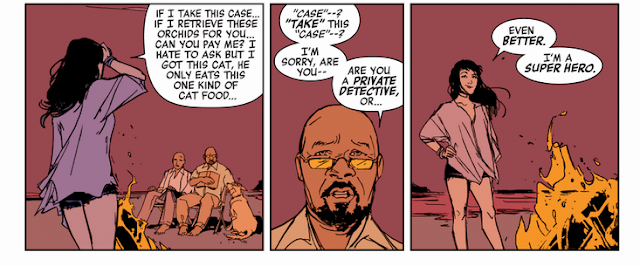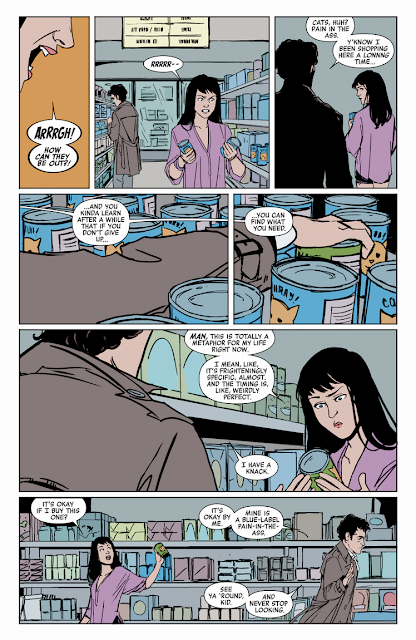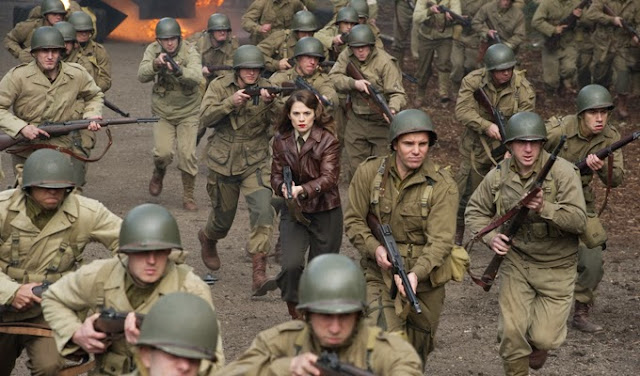 |
| (Photo source: Entropy) |
I think beaches are overrated, and so are swimming pools and waterslide parks. Look, I'm no neckbeard who hates to go outside, but at around college, I outgrew the beaches, pools and waterslide parks I used to spend time in as a kid during some summers and just completely lost interest in the concept of them as enjoyable places to be.
That South Park episode where Cartman gets frustrated about first-graders continually pissing in the pool triggered my latent germophobia about pool water, and then decades later, an episode of Ben Schwartz's Disney/Titmouse cartoon Randy Cunningham: 9th Grade Ninja that used kids' leftover snot from waterslide parks as a plot device (don't ask) confirmed my growing suspicions about the grubbiness of waterslide parks. When you're a kid, you're unconcerned about such things. When you're an adult, splashing around in water for hours to keep the heat from killing you loses all its appeal after you discover better and cleanlier ways to keep the heat from murdering you, like a cold beer or an iced tea. Even California-loving Best Coast frontwoman Bethany Cosentino has said she gets creeped out by the idea of swimming in the ocean. I believe I have a clip of her thinking about having to do that.
Hello there, Dubsmash. And so long, Dubsmash. Whenever The Today Show starts acknowledging the existence of an app or meme, its 15 minutes of coolness are immediately over.
So I may not care anymore for beaches and pools, but I'm always running into escapist literature that's ideal for beachside or poolside reading. One of my favorite recent trade paperback collections of a comic book storyline is especially ideal for beachside or poolside reading--or summertime reading anywhere--because of its summertime setting. I highly recommend it also because it's simply an entertaining arc from a superhero comic that's special for not being a typical superhero comic and for being tailor-made for comics readers like myself who find most superhero comics to be either puerile or unreadable due to overly complicated backstories or convoluted and clumsily written tie-ins to unwieldy crossover events.
 |
| (Photo source: Errant Critic) |
You don't need to have read prior TPB collections of issues of writer Matt Fraction's excellent (and recently concluded) Marvel Now! title Hawkeye to get into Hawkeye: L.A. Woman, although the prior issues are all worth reading, especially Hawkeye #11, an inventively told detective story written from the point of view of a dog and cleverly illustrated by David Aja (with minimal and mostly garbled dialogue by Fraction). The 2014 TPB, the third collection of Fraction's Hawkeye comics, collects Hawkeye Annual #1 (the only issue in the collection illustrated by Javier Pulido, whose minimalist artwork I enjoyed during the Vertigo title Human Target) and issues 14, 16, 18 and 20. All you need to know about Fraction's incarnation of Hawkeye prior to L.A. Woman is that there are two non-superpowered archers who share the mantle of Hawkeye: one of them is recently divorced Avengers member Clint Barton (who, in the Avengers movies, is happily married to a civilian played by Linda Cardellini and raising kids with her out in the Midwest), and the other is the much younger Kate Bishop, a Young Avengers member who may be much better at this hero thing than her mentor Clint. The series alternates between Clint and Kate as the protagonist and follows what both of them are up to when they're not Avengers, and those adventures range from espionage-related peril to slightly more mundane matters like Clint trying to get his apartment building's broken satellite dish to work during a holiday season that's disrupted by tracksuited Russian thugs whose every other word is "bro."
The Russians' addiction to "bro" and the reduction of dialogue in issue 11 so that it's down to only a few words the one-eyed, pizza-loving dog known as Pizza Dog understands (like "collar" and "ex-wife") are hallmarks of the offbeat sense of humor of Fraction, who envisioned Clint as "the Marvel Universe's Jim Rockford" in his update of Hawkeye (the decision to alternate Clint's stories with Kate's is reminiscent of the two-or-more-stars-sharing-the-same-title-role format of another James Garner show, Maverick). Like The Rockford Files, Hawkeye is distinguished by both tongue-in-cheek humor and a bemused hero who'd rather be enjoying a rooftop barbecue with his neighbors (or a show on his DVR he's been itching to catch up on) than stopping trouble, but he always winds up helping out the downtrodden anyway. The Fraction series' parallels to The Rockford Files are particularly visible during the L.A. arc, in which Kate tires of Clint's uncaring attitude and self-destructive streak, packs up everything that belongs to her, like that purple Emma Peeler catsuit made famous by the non-Marvel Avengers (as well as one thing that doesn't belong to her, Pizza Dog), and escapes from New York to L.A., where she starts a private investigation business from her laptop and housesits for the summer a beachside trailer that looks exactly like the Malibu trailer Rockford called home on the show.
That's not all that's borrowed from The Rockford Files. Fraction takes two of Rockfish's occasional sidekicks--Gandolph "Gandy" Fitch, an ex-con who was played on the show by Isaac Hayes, and Marcus "Gabby" Hayes, a private eye who was played by a toupeed Louis Gossett Jr. (and was also a precursor to Tom Selleck's Lance White, a sharp-dressed rival of Rockford's)--and turns them into a newly married gay couple who lives near Kate and tags along with her on her cases. Gandy is renamed Finch, while Marcus gets to keep his name but loses the rug. Finch and Marcus help out Kate as she makes mistakes as a detective along the way but eventually blossoms into both this weird cross between Katniss and Rockfish and a self-sufficient person with a life away from the two father figures who have alienated her (Clint and her actual father, an oily businessman named Derek). Kate's youth and inexperience as a gumshoe might remind Rockford Files fans of another occasional sidekick of Jim's: Richie Brockelman, played by Dennis Dugan, who went on to direct all those terrible Adam Sandler movies that sound like fake Hollywood turkeys David Chase would have made up in one of his Rockford Files scripts that poked fun at SoCal living or how much SoCal pizza sucks ("This ain't a pizza. It's a grilled cheese sandwich").
L.A. Woman also reminds me of the high-quality writing of both Veronica Mars and Terriers, two SoCal P.I. shows that are worthier successors to The Rockford Files than any past or even future attempts to revive Rockford without Garner, whether it's David Shore's unseen and rumored-to-have-been-terrible Rockford reboot pilot with Dermot Mulroney, which failed to get picked up by NBC a few years ago, or the Rockford movie project Vince Vaughn wants to star in and produce. The late Garner's classic show was a once-in-a-lifetime, lightning-in-a-bottle thing that was so infused with Garner's distinctive personality and the late Stephen J. Cannell's equally distinctive creative voice, which is why I'm always skeptical of Universal's attempts to recapture that lightning. When not even the creator of House can get it to work, that's how difficult it is to revive Rockford.
Initially, I was mildly skeptical of the idea of Vaughn playing one of my favorite TV characters. But now I'm way more skeptical. I just can't buy Vaughn anymore as the everyman that Garner was (it would be like getting The Hard Way/The Specialist-era James Woods to play Rockford). Also, ever since Vaughn has become more upfront about his political views, I've been concerned about a Republican who worships guns and has equally strange and bothersome views about race playing a far-from-conservative hero who didn't care for guns (but wasn't afraid to use one) and whose attitudes towards race mirrored those of Garner's in real life, because he's likely going to alter the reluctant-about-guns aspect of the character so that it would be more aligned with his politics. If he does that, then the character's not Rockford anymore. He might as well be Mike Hammer. Now if Vaughn were playing Mike Hammer, that would be a more interesting and perhaps more worthwhile movie.
So now that True Detective's second season has emerged as an unwatchable disaster and is far from the career boost Vaughn must have expected, this Rockford movie project--which, when we last heard about it, was being given a rewrite by 13 Hours: The Secret Soldiers of Benghazi screenwriter Chuck Hogan--is threatening to become more of a reality. If this fucking reboot ever gets made, I wouldn't be surprised if L.A. Woman turns out to be--just like Veronica Mars and Terriers before it--the better Rockford update. Kate may be female and extraordinary with a bow and arrow, but she's already more convincing in the role of an everyman detective than Vaughn will ever be, due to the relatability and humanity both Fraction and a terrific guest artist, Annie Wu, a Venture Bros. storyboarder and the current artist on DC's reimagining of Black Canary as a goth-y rock musician, bring to the character of Kate.
L.A. Woman is such a loving ode to the '70s SoCal P.I. genre that even Elliott Gould's Philip Marlowe from another great '70s SoCal P.I. genre piece, the Robert Altman version of The Long Goodbye, shows up in the form of a new mentor for Kate, an obscure '70s Marvel reporter character named Harold H. Harold. Like Gould in that classic movie, Harold, reimagined by Fraction and Wu as a rumpled P.I. who resembles Gould, is seen shopping for cat food in the supermarket. L.A. Woman is essentially a regular P.I. story about both the alluring and corrupt sides of L.A. that happens to have a masked supervillain as one of the bad guys: Kate's nemesis Whitney Frost, a criminal mastermind who goes by the name of Madame Masque.
Frost's recently announced first appearance in the Marvel Cinematic Universe as an adversary in the upcoming second season of Agent Carter makes L.A. Woman worth picking up for Agent Carter fans who have never read Fraction's Hawkeye and may want to familiarize themselves with Madame Masque, who will be reimagined as a '40s Hollywood actress on the Marvel Studios show. Just like how Agent Carter is a spy show that pits its non-superpowered protagonists against larger-than-life villains straight out of a superhero show and is extremely accessible for people who don't like the superhero genre, Hawkeye, especially during Kate's L.A. arc, is a crime comic where the only superhero comic-ish things about it are the presence of Madame Masque (at one point in the arc, Kate wonders, "What if Madame Masque is the reason why everything in L.A. sucks?") and the occasional cameos by Spider-Man and Wolverine.
With Hawkeye, Fraction wanted to reinvent the superhero comic--and largely succeeded by not approaching it as one. Hawkeye arose from Fraction's frustrations with the inaccessible storylines of most present-day superhero comics. "I think we as an industry fell into this pattern of not caring about new readers anymore," said the Casanova and Sex Criminals creator to the L.A. Times in 2013. "There's a way that you can do it that isn't the clumsy, awkward way that it used to be done where characters refer to themselves in the third person, thinking back on who they are and how they came to be. You don't have to write every comic as if it's the first comic someone's ever read, but you do have to write as though you would like new people to read your comic--which is kind of what Hawkeye is all about."
 |
| Artwork by Annie Wu (Photo source: Wu) |
The series also arose from Fraction's changing views on heroism and his boredom with dourness in superhero comics, which made him long for what he's described as "the Stephen J. Cannell-ness of it all." Fraction was interested in presenting a counterpoint to Batman. "The older you get, the more you live in the world, it's impossible not to look at Batman through class and race," said Fraction to Paste last year. "Batman is a rich white billionaire who beats up poor brown people and the mentally ill. That's weird, right? Kinda weird. A billionaire, punching poor people. But the idea of a guy who came from nothing and stayed just a couple steps away from it, but can't not help you move a couch, that's interesting."
L.A. Woman is a great example of the down-to-earth hero who "can't not help you move a couch," embodied by Kate in this particular arc. She's also a hero whose adventures benefit from a killer soundtrack that's not of the typical John Williams kind. In the letters section of Hawkeye, series artist David Aja would provide a soundtrack for readers to listen to while reading Hawkeye. For example, two of the musical selections Aja listed for Hawkeye's Christmas issue were cues from Sergei Prokofiev's rousing score to the 1938 Sergei Eisenstein epic Alexander Nevsky. For the arc where Clint's ex-wife Mockingbird, Spider-Woman, Black Widow and Kate have to pull Clint out of trouble when he gets himself entangled in the latest predicament of his current girlfriend, a hot, Bridget Regan-ish thief named Cherry, Aja curated a mix of Frank Zappa, surf-rock and fusion tunes like Lalo Schifrin's 1976 disco instrumental "Black Widow" (intended to accompany Black Widow's Grand Central Terminal pursuit of Cherry), Schifrin and Dizzy Gillespie's 1977 collabo "Unicorn" (intended for Kate's badass fight with a pair of Russian thugs) and Herbie Hancock's 1976 jam "Spider" (chosen for the pages where Clint gets slapped around by a plainclothes Jessica Drew, a.k.a. Spider-Woman). As for the classic Pizza Dog issue, Aja's soundtrack consists mainly of jazz to enhance the detective story vibe for Pizza Dog's hunt for a murderer.
Disappointingly, the TPB editions of Hawkeye omit the playlist info. I have no idea what sort of tunes were intended as the soundtrack for the L.A. arc, but I discovered that re-reading the L.A. Woman TPB with tons of La Luz tracks in my headphones works like gangbusters. Or maybe it should be La Luz tracks together with one of Best Coast's love letters to California needle-dropped for the moment when Kate adjusts to SoCal life. There's a propulsiveness to the all-female Seattle band's surf-rock sound that makes their tunes the perfect soundtrack for Kate's arrow-slinging adventures in L.A. and the vibrant visuals of both Wu, who cites Edgar Wright and Nicolas Winding Refn as among her storytelling influences, and colorist Matt Hollingsworth, who brings a consistency to the palette of the arc, despite the many differences in penciling styles between Wu and the more minimalist Javier Pulido.
One of the few complaints from readers about Fraction's Hawkeye was that the wait between issues would frequently take too long for them. The advantage of reading comics in TPB form, which is how I mainly read comics these days, is that TPB readers like myself don't have to worry about waiting. I don't know what it was like for Hawkeye readers to sit and wait for months for the L.A. Woman issues to come out when they were first released. But that would have definitely messed around with the momentum of the arc and prevented me from enjoying the arc in the manner I got to first enjoy it and the manner I recommend to anyone: as light summertime reading, like so many other well-crafted crime novels I've read in the past, whether they're graphic novels or prose novels. The craftiness of L.A. Woman and other equally satisfying crime novels just like it outdoes wading in snot and chlorine any day of the week.
Jack Sheldon's rendition of "The Long Goodbye" from the Altman film of the same name, a film L.A. Woman pays tribute to, is in rotation during "AFOS Prime" on AFOS.








